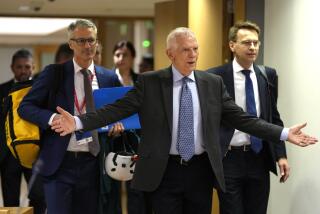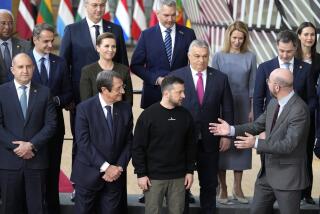EU announces new steps to tackle debt crisis
For those inclined to see the European Union as a hopeless contradiction in terms, the last year and a half has supplied more proof than they could possibly have imagined.
An endless series of emergency meetings, each supposedly the last, has generated little more than strategy pronouncements that are obsolete almost as soon as they’re made. Europe’s leaders have struggled to unite behind a convincing counterattack against a debt crisis that endangers not just the regional but the global economy.
Their lumbering approach was on display again Wednesday as officials argued into the night to formulate the latest “grand plan” to wrestle the crisis under control. This time, EU leaders assured the world, they would unveil a solution that would finally — finally — fix the mess.
After marathon talks, they emerged early Thursday to announce that a new package of measures to rescue the euro currency had been agreed on. The deal entails increasing the firepower of Europe’s bailout fund to about $1.4 trillion, getting holders of Greek debt to take losses of 50%, injecting Europe’s biggest banks with about $150 billion to withstand those losses and providing Athens with an additional $140 billion to stay afloat.
“We have reached an agreement which I believe lets us give a credible and ambitious and overall response to the Greek crisis,” French President Nicolas Sarkozy told reporters, adding that “the results will be a source of huge relief worldwide.”
But that remains to be seen as markets weigh in with their response. Though the new plan addresses the points considered most crucial, many analysts have contended that the bailout fund needs to be twice the size announced Thursday to be more than a temporary solution that merely buys Europe a bit more time.
Experts have also said Europe’s banks may need double to triple the amount that officials agreed on in order to be on sound footing.
Still, the deal gives Europe a plan to tout at next week’s key Group of 20 meeting in Cannes, France, where countries including China and the United States have been hoping to hear a report of major progress.
The goal of finding a comprehensive solution by the self-imposed Wednesday deadline was hampered by more of the squabbling that has bedeviled the EU since the start of the crisis.
In the last few days, Italy bristled at criticism of its finances by Germany, which clashed over boosting the bailout fund with France, which blasted unwelcome meddling from Britain. And nobody wanted any lectures from outsiders, particularly the U.S., which had warned starkly that time was running out for Europe to get its act together.
“It’s complete chaos,” said Marc Touati, an analyst for French investment group Assya. “It is no longer cooperative, or even effective.”
What’s worse, he added, “is that we’re used to it.”
The disarray became increasingly worrisome as the debt crisis edged from countries like Greece and Portugal on Europe’s periphery closer to the continent’s core, including the major economies of Spain and, more ominously, Italy, where financial markets have pushed up Italy’s borrowing costs to close-to-unsustainable levels.
In the weeks leading up to Wednesday’s summit, many analysts and investors were heartened by what seemed like recognition at last by the Eurozone of the gravity of the crisis and the need for a “shock and awe” strategy to beat it back. Leaders themselves began speaking of the talks as a make-or-break moment.
But the dispute between Germany and France, the Eurozone’s dominant duo, over how best to bolster the bailout fund and how much to cut Greece’s debt forced officials to drop their original plan to unveil a solution after talks Sunday.
Then, on Wednesday, the new cutoff date, there was even more uncertainty. Arriving in Brussels, German Chancellor Angela Merkel could tell reporters only that “everyone is traveling here today with the goal of getting a good way further.”
At the same time, the government of Italian Prime Minister Silvio Berlusconi was on the verge of collapse over economic reforms demanded by fellow Eurozone nations. A last-minute compromise with his coalition partners on pension reform and other issues allowed Berlusconi to show up for the summit with some promises in his pocket and his government weakened but intact.
It didn’t help the cause of European unity that Merkel and Sarkozy were essentially seen to have ganged up on the Italian leader a few days earlier. Even his fiercest domestic foes were outraged by a photo of Merkel and Sarkozy smirking knowingly at each other when asked at a news conference what they had said to Berlusconi during a private meeting.
“People are well aware that at the moment the EU is not functioning in an optimal way,” said Daniela Schwarzer, an analyst at the German Institute for International and Security Affairs in Berlin. “And they’re right.”
From the start, the debt crisis has exposed the tensions inherent in the EU between the demands of regional solidarity and the realities of national politics.
Merkel, for one, has often declared her willingness to do “whatever it takes” to save the shared currency. But that apparently does not encompass issuing common Eurozone debt or letting the European Central Bank buy more bonds of troubled nations. Those are measures that many experts say could go a long way toward solving the problem but that German voters oppose.
Instead, Northern European nations, led by Germany, have complained loudly about having to bail out fiscally irresponsible neighbors such as Greece and Portugal. And further steps taken at more than a dozen summits in 18 months have been quickly overtaken by events.
“The decisions were systematically too little too late,” Schwarzer said.
Some experts say that had Germany pushed for a bigger rescue of Greece in the spring of 2010, the crisis could have been nipped in the bud.
On Wednesday, after Merkel told German lawmakers that “what’s good for Europe is good for Germany,” opposition leader Frank-Walter Steinmeier shot back, “I wish I had heard a lot of these sentences a year ago.”
The German Parliament gave Merkel a strong mandate to increase the bailout fund’s firepower but, notably, it was on the premise that Berlin wouldn’t have to cough up any more of the money. The new plan entails leveraging the fund to about $1.4 trillion from its current size of $600 billion by turning it into an insurance fund against a portion of losses for holders of Eurozone public debt and by setting up an investment vehicle to attract money from other countries, including emerging economies. That raises the prospect of the world’s richest trading bloc appealing for help from such nations as India and Brazil.
Though many have accused the EU of dithering throughout the crisis, some say that characterization is unfair. Leaders are rightly constrained by domestic politics and public opinion, they say, and their disputes are part of the democratic process.
“It gets a bit much to expect individuals, whether it’s Sarkozy or Merkel or anyone else, to be these magicians or to pull some idea out of a hat,” said Chris J. Bickerton, a political scientist at the University of Amsterdam. “It’s not really individual leaders that’ll generate solutions. It’s a broader public debate about the options.”
But the question is how much time Europe has to sort itself out once and for all before the crisis overtakes it completely and confidence from investors and the general public crashes.
The fact that leaders took so long to reach an agreement “shows the markets that the European Union is extremely fragile, and that the EU could potentially crack,” said Henri Sterdyniak, an expert at the Paris Institute of Political Sciences. “There is a lack of leadership, and we have nobody to impose a strategy in Europe.”
Special correspondents Devorah Lauter in Paris and Aaron Wiener in Berlin contributed to this report.
More to Read
Start your day right
Sign up for Essential California for news, features and recommendations from the L.A. Times and beyond in your inbox six days a week.
You may occasionally receive promotional content from the Los Angeles Times.







